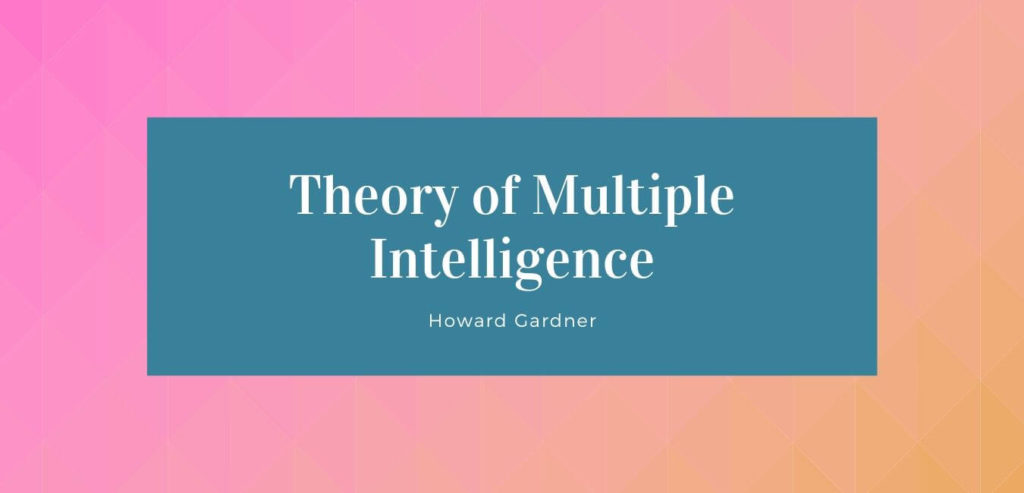Howard Gardner claimed that most previous conceptualisations of intelligence had been too narrowly based. He argued that evidence from several different sources (e.g. cross-cultural accounts of cognition, studies of exceptional groups, psychometric data, and psychological training studies) pointed to the existence of several intelligences. According to Gardner, intelligence is much more than IQ because a high IQ in the absence of productivity does not equate to intelligence. Consequently, instead of intelligence being a single entity described psychometrically with an IQ score, Gardner established several criteria for defining intelligence. Howard Gardner proposed the theory of multiple intelligences.
Intelligence is a bio-psychological potential to process information that can be activated in a cultural setting to solve problems or create products that are of value in a culture.
Howard Gardner’s definition of Intelligence
Howard Gardner’s Theory of Multiple Intelligences
According to him, distinct types of intelligences exist and each of these intelligences are independent of each other. This means that, if a person exhibits one type of intelligence, it does not necessarily indicate being high or low on other types of intelligences. Additionally, these different types of intelligences interact and work together to find a solution to a problem.
To categorise these different types of intelligences, Gardner established several criteria for defining intelligence and to qualify as “intelligence”,the “candidate intelligences” had to meet the defined eight criteria’s. From these eight criteria, Gardner initially formulated a list of seven intelligences. In 1999, he added naturalist intelligence as the eighth. These are as follows:
Gardner’s Eight Intelligences:
Verbal-Linguistic Intelligence:
- It is the capacity to use language fluently and flexibly to express one’s thinking and understand others.
- Persons high on this intelligence are ‘word-smart’, i.e. they are sensitive to different shades of word meanings, are articulate, and can create linguistic images in their mind.
- Poets and writers are very strong in this component of intelligence.
Logical – Mathematical Intelligence:
- Persons high on this type of intelligence can think logically and critically.
- They engage in abstract reasoning, and can manipulate symbols to solve mathematical problems.
- Scientists and Nobel Prize winners are likely to be strong in this component.
Visual – Spatial Intelligence:
- It refers to the abilities involved in forming, using, and transforming mental images.
- The person high on this intelligence can easily represent the spatial world in the mind.
- Pilots, sailors, sculptors, painters, architects, interior decorators, and surgeons are likely to have highly developed spatial intelligence.
Musical Intelligence:
- It is the capacity to produce, create and manipulate musical patterns.
- Persons high on this intelligence are very sensitive to sounds and vibrations, and in creating new patterns of sounds.
Bodily – Kinesthetic Intelligence:
- This consists of the use of the whole body or portions of it for display or construction of products and problem solving.
- Athletes, dancers, actors, sportspersons, gymnasts, and surgeons are likely to have such kind of intelligence.
Inter-personal Intelligence:
- This is the skill of understanding the motives, feelings and behaviours of other people so as to bond into a comfortable relationship with others.
- Psychologists, counsellors, politicians, social workers, and religious leaders are likely to possess high interpersonal intelligence.
Intra-personal Intelligence:
- This refers to the knowledge of one’s internal strengths and limitations and using that knowledge to effectively relate to others.
- Persons high on this ability have finer sensibilities regarding their identity, human existence, and meaning of life.
- Philosophers and spiritual leaders present examples of this type of intelligence.
Naturalistic Intelligence:
- This involves complete awareness of our relationship with the natural world. It is useful in recognising the beauty of different species of flora and fauna, and making subtle discriminations in the natural world.
- Hunters, far mers, tourists, botanists zoologists, and bird watchers possess more of naturalistic intelligence.




